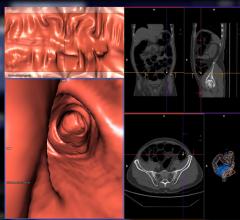March 5, 2008 - The American College of Radiology agrees with the American Cancer Society (ACS) in support of research findings that show the inclusion of Computed Tomographic Colonography (CTC), also known as virtual colonoscopy, as a main screening exam for colorectal cancer.
The first joint consensus guidelines for colorectal cancer screening, released by the ACS, ACR and the U.S. Multi-Society Task Force on Colorectal Cancer, now includes CTC as an option for colorectal cancer screening and prevention in average-risk adults age 50 years and older and recommended to be received once every five years.
According to findings of the National CT Colonography Trial coordinated by the American College of Radiology Imaging Network (ACRIN) and presented at the 2007 ACRIN Fall Meeting, CTC is comparable to optical colonoscopy for the detection of cancer and clinically significant polyps when state-of-the-art techniques are applied and images are read by radiologists trained in the procedure. Results of the ACRIN trial are expected to be published later this spring.
To ensure acceptable, consistent levels of performance, quality assurance measures should be implemented by all providers who offer this test. The American College of Radiology has published practice guidelines for CTC, and has outlined practice-based quality metrics.
CT colonography employs cutting-edge, virtual reality technology to produce 3D “fly through” images that permit a thorough and minimally invasive evaluation of the entire colorectal structure. The exam does not require sedation, allowing patients to resume normal activity, including driving, immediately after the procedure.
For more information: www.acrin.org


 February 06, 2024
February 06, 2024 








